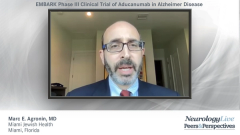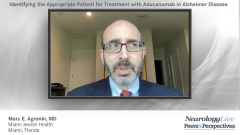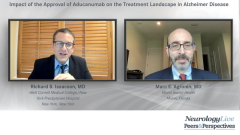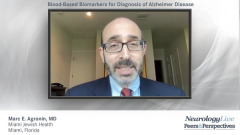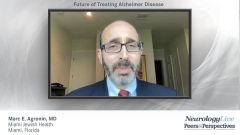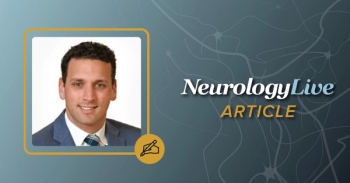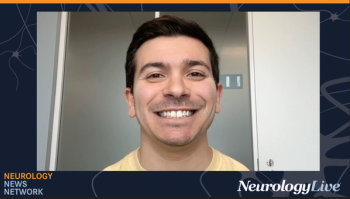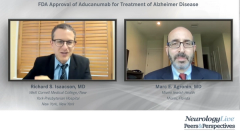
Future of Treating Alzheimer Disease
Drs Richard S. Isaacson and Marc E. Agronin look to the future of treating Alzheimer disease with the emphasis on early diagnosis.
Episodes in this series

Richard Isaacson, MD: To wrap up my final question, how will the future of our field look with increasing early diagnosis of Alzheimer's? Now that we have targeted therapies to you know change trajectory, potentially disease-modifying. Yes, no – Again, we can fight about the data. We're not going to talk about the data today, we've talked about that a lot in other things, and other sessions, and there's lots of data out there. How do you think our field is truly going to change with an emphasis on early diagnosis? Is this feasible? You and I have had more calls in the last 3 days. Speaking myself, in the last 3 days, I've had more calls and emails than I've had in the last, I would say, almost a year? I don't know. Six months easily combined in literally the first 3 days since approval. How is this going to change? Are we going to be screening people more like really this time? Are we going to be bringing people earlier? Are people going to understand what MCI [mild cognitive impairment] is? Our primary care doctor is going to be able to make these types of very challenging decisions. I have a waitlist. I'm not sure if you have a waitlist. I bet you do. What's the future going to be like? What are the next 3, 6, 9, 12 months and 2 years going to look like?
Marc E. Agronin, MD: Well, my hope and this is longer than 3, 6, 9 months since I'm thinking 10, 15 years from now. I would use the model of colonoscopies. I think everyone in their 50s is going to have a multi-level screening. It's going to involve blood tests for amyloid and tau, to begin with. It will involve probably computerized cognitive testing, similar to a lot of what you do in your prevention clinic because you're trying to detect early. You'll have a battery of tests, a little more complicated than a colonoscopy, but maybe a little simpler in other respects.
That's going to give you an increasing risk, an indication whether this is really Alzheimer's and we will do that to the end of getting you on preventative treatment, and not just lifestyle issues which you've done a lot of work in which is really critically important. Everyone should be focusing on healthy lifestyle, but some sort of specific whether it's immunotherapy or some of these other emerging treatments that you will begin before you become symptomatic. Maybe not 10 or 15 years, it may be a little longer than that, but I envision that's what's going to be the future to actually eradicate this disorder, because you're going to have to start in your 50s. If you wait longer than that, it's going to be a little too late. It’s my guess. Now, that will be for Alzheimer's disease, we have to remember that we still have other forms of neurocognitive disorders like Lewy body disease which are in many ways’ tougher diseases. We have to make sure we keep our focus on those as well, because those are equally as devastating to people and their loved ones.
Richard Isaacson, MD: I had a patient today came to me for a prevention, or risk reduction, or learning more about what he could do for modifiable Alzheimer's, and I got the pathology report of his father and he had Lewy body. I said, "Oh, well did he have funny dreams? Oh, yes, he acted out his dreams. He would kick and punch in his sleep. Oh, yes, we'd see these little animals and things like that. That was just Alzheimer's, right?” No, that was Lewy body. Lewy body prevention and treatment are the next frontier and subdividing. Now, that we're going to have these biomarkers is there to, so I completely agree.
Well, Dr Marc Agronin, this has been a long time coming. We're talking about a new FDA-approved drug. For all the good, for all the bad, for all the controversy, it's here. As physicians that care about our patients and want to help them, we have to figure out some way to help them to balance the risks the benefits, and of course, the costs which we talked a little bit about today. I think our jobs just got a lot harder.
Marc E. Agronin, MD: No question.
Richard Isaacson, MD: As long as it leads to better patient outcomes, it's great but I guess that we'll have to figure that out as things come in and who at what stage, at what dose. We'll hopefully know a lot more, hopefully, we can continue the conversation, and have a similar conversation again.
Marc E. Agronin, MD: It's true. It's just as you said, it's here, whether clinicians agree, disagree are skeptical, hopeful, it makes no difference. It's here, and we all have the obligation to get on board and get involved with our patients and do what's going to be in their best interest. It's going to be a work in progress but we can't shy away from that.
Richard Isaacson, MD: They're going to come to us with questions and that's why you have to give our best opinion. Thanks so much for watching this NeurologyLive Peers and Perspectives. If you enjoy this content, please subscribe to our e-newsletters to receive upcoming programs and other great content in your inbox. Dr Agronin, thanks so much.
Marc E. Agronin, MD: Thank you. My pleasure.
Transcript Edited for Clarity
Newsletter
Keep your finger on the pulse of neurology—subscribe to NeurologyLive for expert interviews, new data, and breakthrough treatment updates.

